|
John F. Herring, Jr. - The English Farmyard
Click on a painting below to start the exhibition
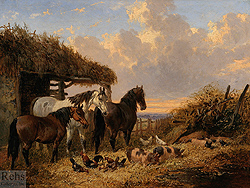 John F. Herring, Jr.End of Day John F. Herring, Jr.End of Day |
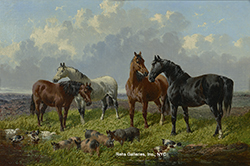 John F. Herring, Jr.Farmyard Friends John F. Herring, Jr.Farmyard Friends |
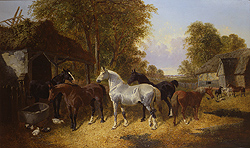 John F. Herring, Jr.Farmyard Friends John F. Herring, Jr.Farmyard Friends |
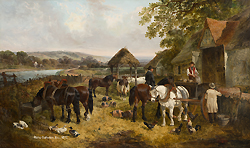 John F. Herring, Jr.Farmyard, St. Albans, England John F. Herring, Jr.Farmyard, St. Albans, England |
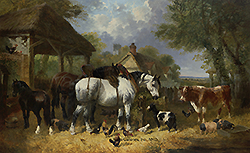 John F. Herring, Jr.Horses, Goat, Cow, Pigs and Poultry in a Farmyard John F. Herring, Jr.Horses, Goat, Cow, Pigs and Poultry in a Farmyard |
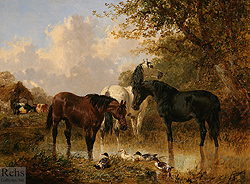 John F. Herring, Jr.The Watering Hole John F. Herring, Jr.The Watering Hole |
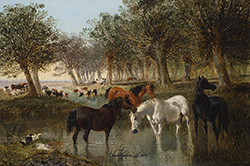 John F. Herring, Jr.Watering Horses John F. Herring, Jr.Watering Horses |
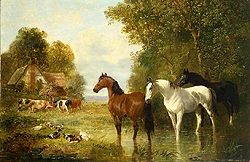 John F. Herring, Jr.Farmyard Scene John F. Herring, Jr.Farmyard Scene |
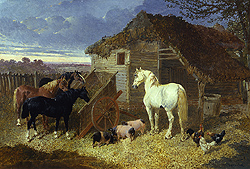 John F. Herring, Jr.The Close of the Day John F. Herring, Jr.The Close of the Day |
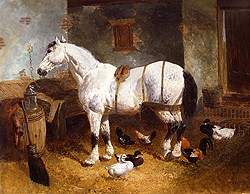 John F. Herring, Jr.Horse and Poultry in a Barn John F. Herring, Jr.Horse and Poultry in a Barn |
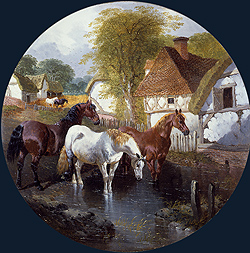 John F. Herring, Jr.At the Watering Hole John F. Herring, Jr.At the Watering Hole |
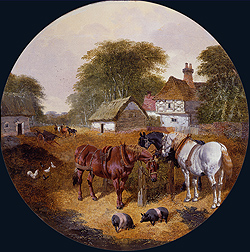 John F. Herring, Jr.The Hay Trough John F. Herring, Jr.The Hay Trough |
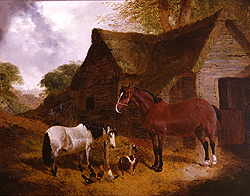 John F. Herring, Jr.Farmyard John F. Herring, Jr.Farmyard |
 John F. Herring, Jr.The Watering Hole John F. Herring, Jr.The Watering Hole |
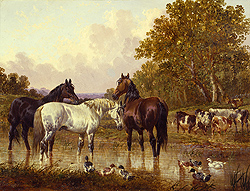 John F. Herring, Jr.At the Watering Spot John F. Herring, Jr.At the Watering Spot |
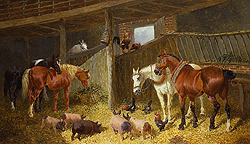 John F. Herring, Jr.Barnyard Interior John F. Herring, Jr.Barnyard Interior |
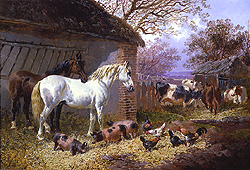 John F. Herring, Jr.Farmyard John F. Herring, Jr.Farmyard |
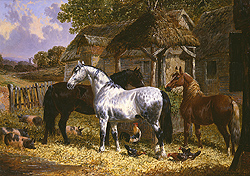 John F. Herring, Jr.Horses in a Farmyard John F. Herring, Jr.Horses in a Farmyard |
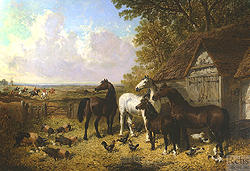 John F. Herring, Jr.Farmyard John F. Herring, Jr.Farmyard |
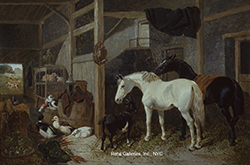 John F. Herring, Jr.The Barnyard, Meopham John F. Herring, Jr.The Barnyard, Meopham |
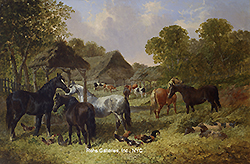 John F. Herring, Jr.Farmyard Friends John F. Herring, Jr.Farmyard Friends |
 John F. Herring, Jr.Farmyard Friends John F. Herring, Jr.Farmyard Friends |
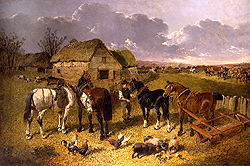 John F. Herring, Jr.Fox Hunt Passing the Farm John F. Herring, Jr.Fox Hunt Passing the Farm |
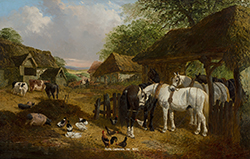 John F. Herring, Jr.Farmyard Friends John F. Herring, Jr.Farmyard Friends |
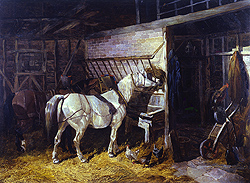 John F. Herring, Jr.Afternoon Meal John F. Herring, Jr.Afternoon Meal |
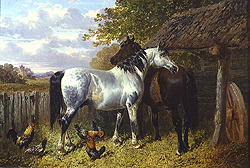 John F. Herring, Jr.Horses and Poultry in a Paddock John F. Herring, Jr.Horses and Poultry in a Paddock |
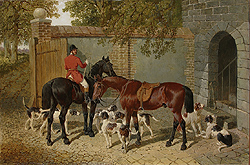 John F. Herring, Jr.Preparing for the Hunt John F. Herring, Jr.Preparing for the Hunt |
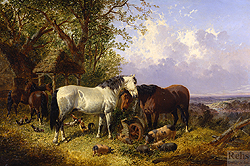 John F. Herring, Jr.Outside the Barn John F. Herring, Jr.Outside the Barn |
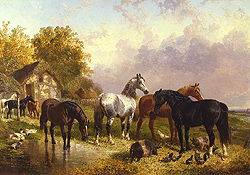 John F. Herring, Jr.Horses in a Farmyard John F. Herring, Jr.Horses in a Farmyard |
|
|
John F. Herring, Jr. was born in Doncaster c.1820, to the well-known 19th century artist John F. Herring, Sr. Herring, Sr., at that time, was considered one of England’s greatest Sporting and Equestrian artists and was therefore patronized by the English aristocracy. His mastery of the brush and popularity among the nobles served his son, Herring, Jr., well. Early on he was exposed to fine painting and wealthy patrons.
It has been stated in a number of recent reference books that Herring, Sr.’s first child was named John Frederick Herring, Jr. and was born on June 21, 1815 and baptized on October 22, 1815. However another child was born in 1820 and also named John Frederick Herring, Jr. (baptized in 1821). The assumption is that the first Herring child died and the second, born in 1820, is the artist we know of today.
It is no surprise that Herring, Jr. developed a love for painting – a passion that was also shared by his brothers Charles and Benjamin. Three of Herring, Sr.’s four sons became artists and painted in the same style as their father – often collaborating on a single painting.
In the years after 1836, Herring, Sr., feeling threatened by Herring, Jr.’s abilities and growing popularity, began incorporating the ‘SR’ at the end of his signature.
Herring, Jr. continued to paint, in the tradition of his father, sporting and animal pictures, however as his artistic prowess developed his style changed – loosening his brushwork and widening his views. The placement of farm animals at the banks of a stream or in a farmyard were characteristic of his work.
Herring, Jr. married Kate Rolfe, an artist herself and the daughter of Alexander Rolfe, the English angling and sporting artist. Herring, Jr. would, at times, collaborate with his father-in-law, as well as other artists - painting the animals in their works.
During his lifetime Herring exhibited at all the major exhibition halls including the Royal Academy, where he exhibited: The Farm – Autumn (1863), Farm-yard (1864), Watering the Team (1869), The Homestead (1871) and A Farm yard (1872) among others.
This essay is copyrighted by Rehs Galleries, Inc. and may not be reproduced or transmitted without written permission from Rehs Galleries, Inc. |